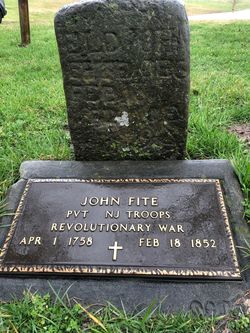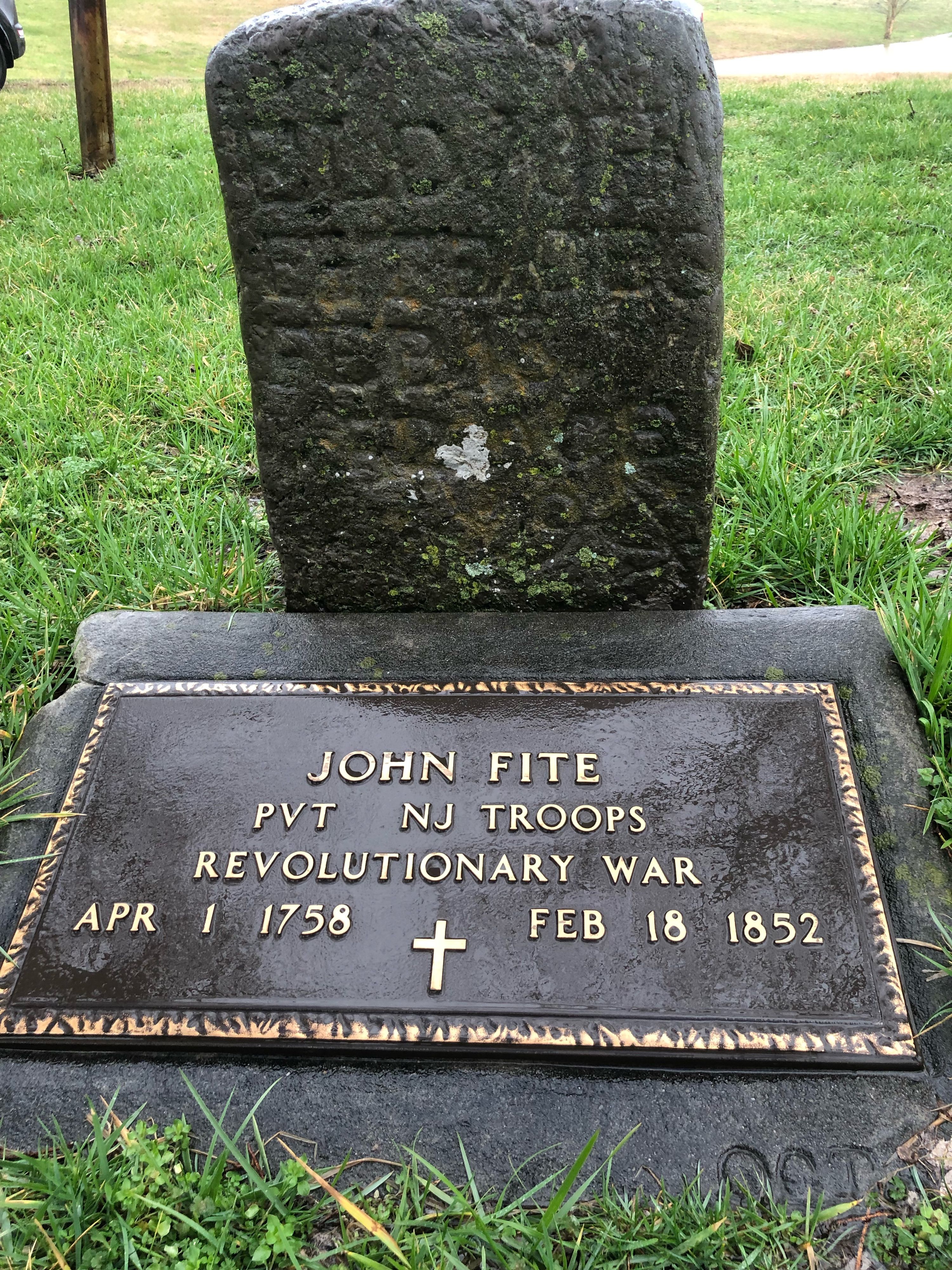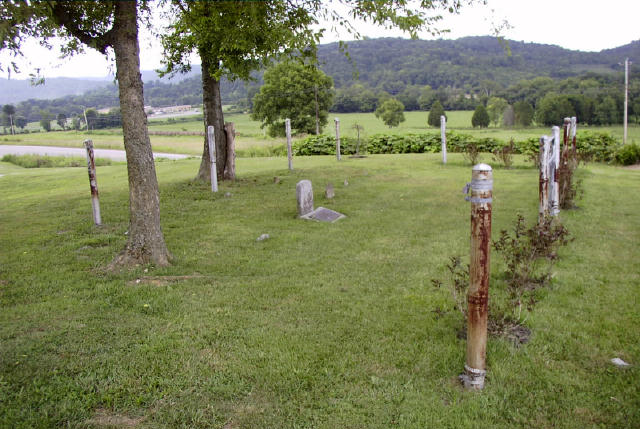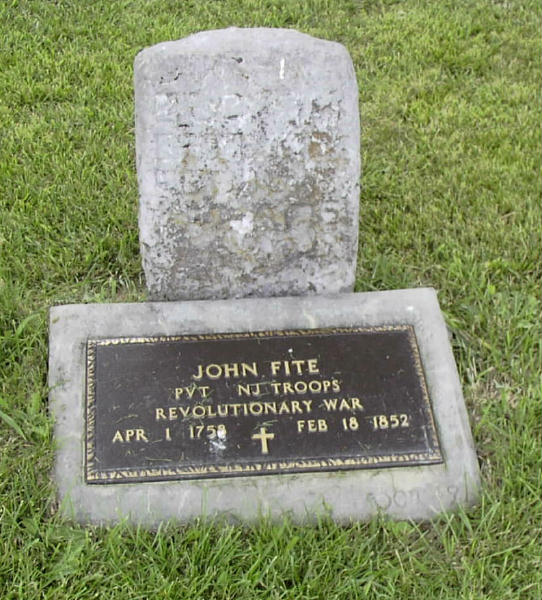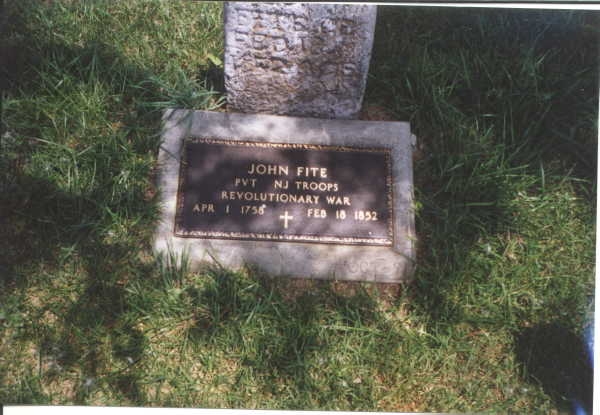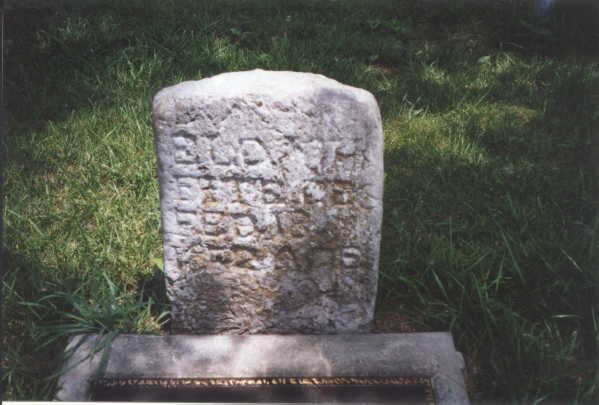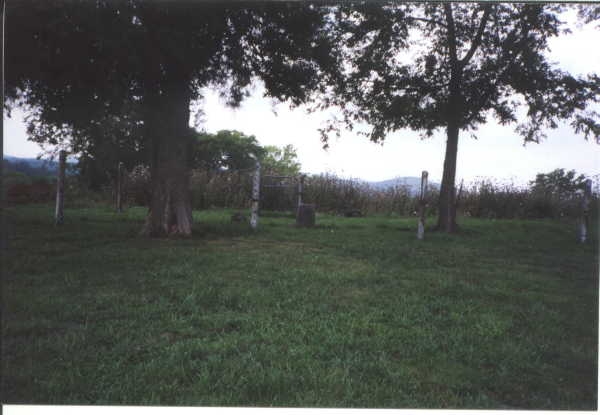John Fite, son of Johannes Fite and Catherine Elizabeth Fite, was born on April 1, 1758 in Greenwich Township, Sussex County, New Jersey. He fought in the Revolutionary War as a private in the New Jersey militia. He married Martha Haslet in 1785 and had seven children Peter, John, Thomas, Moses, Martha, and Henry. He was a Baptist minister.
∼
SAR Patriot #: P-158939
∼
A few of the dates in the sketch below are wrong. John Fite moved to North Carolina in 1784-85 where he resided almost 14 years. He left North Carolina and settled in Smith County, Tennessee in 1798.
Death of a Soldier of the Cross, and of the American Revolution
By Moses Fite (1791-1871)
Published in The Tennessee Baptist (10 April 1852)
Rev. John Fite departed this life on the morning of the 18th of February, 1852, at the residence of his son, Rev. Henry Fite, near Liberty, DeKalb County, Tenn., in the ninety-fourth year of his age. He was born in Sussex County, New Jersey, and at the age of seventeen enlisted in the Army, under Washington, and was in several important engagements with the enemy, in one of which he was slightly wounded. About the close of the war he was married to Martha Haslet; soon after made a profession of religion and united with the Lutherans. In 1786 (should be 1787- Ed.) he removed to Lincoln County, North Carolina, where he found but few of the Lutheran profession; and the Presbyterians so nearly affiliating in doctrine with his own people, he connected himself with them and was chosen a ruling elder. He was then in the vigor of manhood, and had become convinced that it was his duty to preach the gospel. Not having had the advantages of a liberal education (the Presbyterians required knowledge of the ancient languages - Ed.) as required by the Presbyterian standards, of candidates for the ministry, he could not obtain a license. Having lived twelve years in North Carolina (should read nine years - Ed.), in 1798 (1796 - Ed.) he turned his footsteps westward and found his way to the Cumberland river, in Tennessee, and crossed over in sight of Nashville, then but a small village (Nash's Lick - Ed.). He pursued his way to Mill Creek, where he rested two weeks.
The region of territory, then known as Smith's Fork, lying on both sides of a steam of that name, and afterwards included in Smith County, and later in DeKalb County, was at that time attracting much attention, on account of its fertility, and he determined to move there. He had to cut his road fifty-five miles through a wilderness, which required sixteen days of hard toil. Here he unloaded his wagon, put his family and effects in a cane tent, and turned back to Nashville to procure a supply of corn meal, his family, in the meantime, subsisting on bear meat purchased from the Indians. Such are specimens of the hardships our forefathers endured in settling this now fruitful and finely cultivated country. Having opened a road, as before observed, leading from Mill Creek to Smith's Fork, other settlers soon followed him, and among them were Methodists and Presbyterians; preachers who organized societies as the wants of the settlement required. Father Fite connected himself with the Presbyterian society at Spring Creek, eighteen miles distant from his home, where his membership continued ten years.
About this time the Baptists were organizing churches in this section of the country, and he was led to examine the views of the Baptists, by comparing them with the Scriptures. He also read Pedobaptist works with an honest and enquiring heart. Acting under these influences it is not strange that he was not long in forming his opinion as to the side of which had the truth. Church government had also entered deeply into his investigations. The anti-republican character of the organization with which he was connected, to his mind, was clear and conclusive. In short, he had, in his investigations, become a thorough Baptist, and in 1813 his connections with the Presbyterians terminated, and he was baptized into the fellowship of the Baptist church. His former convictions of duty, in reference to preaching the Gospel returned with full force, which was not obstructed by his brethren, though he had, at this time, attained to between fifty and sixty years of age. He was soon solemnly ordained to the work, and the histories by his labors prove that he was an efficient worker that need not be ashamed. Under his ministry many churches have been organized, and multitudes have been accustomed to regard him as their spiritual father. He continued his ministerial labors until his ninety- second year.
Father Fite had now outlived his generation. The amiable partner of his bosom had gone to her rest twenty-three years before (Martha Haslet Fite, died 1829). He was now in the fourth generation of his children, and, although resigned to the will of God, he desired to go where he could be with Abraham, Isaac and Jacob. He seemed to retain the full fruition of his faculties to the hour of his death, and Jacob-like, drew up his feet in his bed and gave up the ghost. Thus he passed from our midst, the venerable John Fite.
We close with a few remarks respecting his Christian and ministerial character. His sermons, in many respects, might, with great propriety, be taken as models by our young ministers; in general, they were short, pithy, and pointed. He was a fluent speaker, both in the German and English languages. He was a close reader of the Bible, as well as theological and historical works in general. Aided by one of the best of wives, he was remarkably regular in his habits. Morning and night he maintained family worship, and, in his absence, his pious wife took his place in conducting the services.
He was the father of ten children, five of whom survive him, and are professors of religion, one a Baptist preacher. May the pious life of our aged father stimulate us all to follow his counsels and virtuous examples.
John Fite, son of Johannes Fite and Catherine Elizabeth Fite, was born on April 1, 1758 in Greenwich Township, Sussex County, New Jersey. He fought in the Revolutionary War as a private in the New Jersey militia. He married Martha Haslet in 1785 and had seven children Peter, John, Thomas, Moses, Martha, and Henry. He was a Baptist minister.
∼
SAR Patriot #: P-158939
∼
A few of the dates in the sketch below are wrong. John Fite moved to North Carolina in 1784-85 where he resided almost 14 years. He left North Carolina and settled in Smith County, Tennessee in 1798.
Death of a Soldier of the Cross, and of the American Revolution
By Moses Fite (1791-1871)
Published in The Tennessee Baptist (10 April 1852)
Rev. John Fite departed this life on the morning of the 18th of February, 1852, at the residence of his son, Rev. Henry Fite, near Liberty, DeKalb County, Tenn., in the ninety-fourth year of his age. He was born in Sussex County, New Jersey, and at the age of seventeen enlisted in the Army, under Washington, and was in several important engagements with the enemy, in one of which he was slightly wounded. About the close of the war he was married to Martha Haslet; soon after made a profession of religion and united with the Lutherans. In 1786 (should be 1787- Ed.) he removed to Lincoln County, North Carolina, where he found but few of the Lutheran profession; and the Presbyterians so nearly affiliating in doctrine with his own people, he connected himself with them and was chosen a ruling elder. He was then in the vigor of manhood, and had become convinced that it was his duty to preach the gospel. Not having had the advantages of a liberal education (the Presbyterians required knowledge of the ancient languages - Ed.) as required by the Presbyterian standards, of candidates for the ministry, he could not obtain a license. Having lived twelve years in North Carolina (should read nine years - Ed.), in 1798 (1796 - Ed.) he turned his footsteps westward and found his way to the Cumberland river, in Tennessee, and crossed over in sight of Nashville, then but a small village (Nash's Lick - Ed.). He pursued his way to Mill Creek, where he rested two weeks.
The region of territory, then known as Smith's Fork, lying on both sides of a steam of that name, and afterwards included in Smith County, and later in DeKalb County, was at that time attracting much attention, on account of its fertility, and he determined to move there. He had to cut his road fifty-five miles through a wilderness, which required sixteen days of hard toil. Here he unloaded his wagon, put his family and effects in a cane tent, and turned back to Nashville to procure a supply of corn meal, his family, in the meantime, subsisting on bear meat purchased from the Indians. Such are specimens of the hardships our forefathers endured in settling this now fruitful and finely cultivated country. Having opened a road, as before observed, leading from Mill Creek to Smith's Fork, other settlers soon followed him, and among them were Methodists and Presbyterians; preachers who organized societies as the wants of the settlement required. Father Fite connected himself with the Presbyterian society at Spring Creek, eighteen miles distant from his home, where his membership continued ten years.
About this time the Baptists were organizing churches in this section of the country, and he was led to examine the views of the Baptists, by comparing them with the Scriptures. He also read Pedobaptist works with an honest and enquiring heart. Acting under these influences it is not strange that he was not long in forming his opinion as to the side of which had the truth. Church government had also entered deeply into his investigations. The anti-republican character of the organization with which he was connected, to his mind, was clear and conclusive. In short, he had, in his investigations, become a thorough Baptist, and in 1813 his connections with the Presbyterians terminated, and he was baptized into the fellowship of the Baptist church. His former convictions of duty, in reference to preaching the Gospel returned with full force, which was not obstructed by his brethren, though he had, at this time, attained to between fifty and sixty years of age. He was soon solemnly ordained to the work, and the histories by his labors prove that he was an efficient worker that need not be ashamed. Under his ministry many churches have been organized, and multitudes have been accustomed to regard him as their spiritual father. He continued his ministerial labors until his ninety- second year.
Father Fite had now outlived his generation. The amiable partner of his bosom had gone to her rest twenty-three years before (Martha Haslet Fite, died 1829). He was now in the fourth generation of his children, and, although resigned to the will of God, he desired to go where he could be with Abraham, Isaac and Jacob. He seemed to retain the full fruition of his faculties to the hour of his death, and Jacob-like, drew up his feet in his bed and gave up the ghost. Thus he passed from our midst, the venerable John Fite.
We close with a few remarks respecting his Christian and ministerial character. His sermons, in many respects, might, with great propriety, be taken as models by our young ministers; in general, they were short, pithy, and pointed. He was a fluent speaker, both in the German and English languages. He was a close reader of the Bible, as well as theological and historical works in general. Aided by one of the best of wives, he was remarkably regular in his habits. Morning and night he maintained family worship, and, in his absence, his pious wife took his place in conducting the services.
He was the father of ten children, five of whom survive him, and are professors of religion, one a Baptist preacher. May the pious life of our aged father stimulate us all to follow his counsels and virtuous examples.
Family Members
Advertisement
Advertisement
